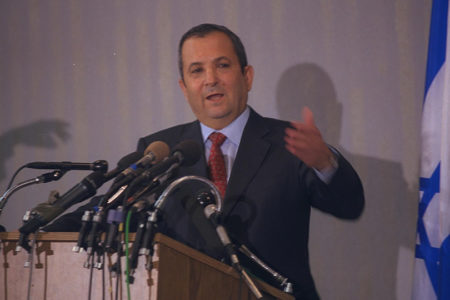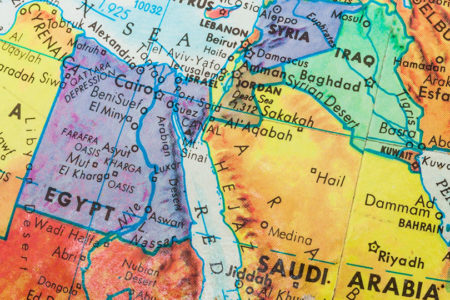Israel at the Crossroads
As I sat in the Israeli Government Press Office auditorium with many “weathered” journalists from around the world, a scene unfolded on the large-screen television before me that amazed us all. There in Washington, D.C., on the White House lawn, was the President of the United States urging two sworn enemies to shake hands after signing a peace pact.
These two long-time warriors were being forced to shake hands at a time when the world was wondering if what was happening on international television was real. Israeli Prime Minister Yitzhak Rabin and PLO Chairman Yasser Arafat, for years combatants on the battlefield, had just signed the Oslo Accords, a peace agreement between the Israelis and the Palestinians.
It was September 13, 1993, a day that would mark the beginning of years of negotiations, concessions, transfers of real estate, and murderous terrorist activities. Instead of bringing the people of Israel together, this historic event witnessed by the world-at-large would divide them as they had not been divided since the rebellion of the ten tribes in the days of King Rehoboam.
Now, six years later, it looks as though history may be repeating itself. As the world looked on, Israeli Prime Minister Ehud Barak and Yasser Arafat signed a new agreement in mid-September. Fanned by cool breezes from the Red Sea, the two shook hands in a ceremony in a beach hotel in Sharm El-Sheikh, Egypt, as American Secretary of State Madeleine K. Albright beamed in the background. The full extent of Israeli reaction to this treaty remains to be seen.
But I well remember the mass demonstration that took place in Jerusalem six years ago as hundreds of thousands of Israelis took to the streets in protest against the signing of the Oslo Accords by Prime Minister Rabin. As I stood among this large gathering, made up primarily of religious Jews who lived in the territories, I heard them say Mr. Rabin did not understand that the land, the Book, and the people were inseparable.
These Israelis feared this treaty would cost them their homes, farms, businesses, and birthright to the land promised to their forefathers. This fear had driven them into the streets and would motivate them in the struggle that has lasted over these past six years.
Part of their struggle for the land has been in the political arena. They believe that for more than one hundred years, God has been fulfilling His promise to restore them to their land. The movement to retain the territories—commonly known as the West Bank and Gaza—was the main force behind the 1996 election of Benjamin Netanyahu as prime minister.
Yet, even though Netanyahu had campaigned against the Oslo Accords and the whole peace process as set forth in the agreement, the newly elected prime minister was forced to continue what his predecessors had started. This situation ultimately resulted in Netanyahu’s defeat in the national elections of May 1999.
Prime Minister Yitzhak Rabin, who was assassinated in 1995, and Shimon Peres, who succeeded him, both worked long and hard to normalize the Oslo Accords. Instead of normalization, however, they witnessed an increase in terrorist attacks on Israelis, a lack of effort to combat terrorism, and incitement over the status of the city of Jerusalem. While “negotiating” for peace, Palestinian leader Yasser Arafat was laying claim to the Jewish city as the capital of a future Palestinian state and was expanding his “police force” into a military force.
Consequently, Israelis decided that Netanyahu could better lead the country to “peace with security” and went to the polls to change the leadership of Israel. The root of the problem, however, was that the Oslo Accords had not spelled out all the details for a comprehensive peace between the Israelis and the Palestinians, only a general direction that must be negotiated by the parties.
Rabin, in an effort to bring about peace at any cost, had made many concessions to the Palestinians after signing the agreement at the White House. One of those concessions was the promise to relinquish Hebron to the control of the Palestinian Authority. Before that agreement was completed, an assassin’s bullet struck him down and stalled the process.
Because of his promise to honor the Oslo Accords, Netanyahu was compelled to complete the transfer of Hebron, the oldest Jewish community in the world, to the Palestinians. This action fomented a mistrust of Netanyahu among the very people who had worked so hard to bring him to power. Furthermore, by agreeing to transfer more land to the Palestinians in signing the Wye River Accords, Netanyahu fatally wounded himself politically.
Through the actions of first Rabin and then Netanyahu, it seemed that the same pattern was emerging on both sides of the body politic: Leaders would go to the negotiating table, make concessions, then give land—supposedly for peace. This method of making peace was viewed as very dangerous, especially in the Middle East.
While the resolve of these Israeli leaders was being worn down, the Palestinian “peace makers” were growing stronger in their determination to bring about a Palestinian state with Jerusalem as its capital. They were also progressing with their plans to have terrorist Palestinian prisoners released, to have refugees returned to the land, and to have the Jewish settlements on the West Bank and Gaza shut down.
The United States, at first committed to becoming a facilitator for the peace process, now seems to be taking sides with the Palestinians. I make this statement based on the actions of U.S. State Department officials, the Secretary of State, and even President Clinton himself.
On a visit to the Palestinian area last year, and in recent communiqués, Clinton told Arafat and the Palestinian people that the United States is working for them to be able “to determine their own destiny, in their own land.” Such statements appear to presume the outcome of any “final-status” talks between the two parties who are supposed to be discussing the “possibility” of a Palestinian state.
Given this information, the intransigent stand of the Palestinians, and their failure to comply with already signed agreements, one sees additional roadblocks in the way of true coexistence with Israel. For example, the Palestinian Authority has made only a feeble attempt at best to combat terrorism.
In fact, since the signing of the Oslo Accords in 1993, more Israelis have been killed by terrorist attacks than in the previous 45-year history of the modern-day State of Israel. This illuminates the failure of Yasser Arafat and his leadership to comply with treaty agreements. The Palestinians have also refused to hold the number of their “policemen” to the agreed limit in the Oslo Accords. These are only a few illustrations that establish evidence of Palestinian noncompliance.
In addition to not complying with the peace accords, the Palestinians are becoming very aggressive in their approach to the entire process. They are making demands for “all or nothing” in the upcoming talks. Nabil Sah’ath, head of the Planning Department in the Palestinian Authority, told Egypt’s Al-Ahram newspaper recently, “There can be no peace without a total end to settlements and the return of East Jerusalem to Palestinian sovereignty as our capital. We are willing to negotiate the terms regarding open borders between East and West Jerusalem, but an agreement must be based on the premise that what was occupied in 1967 must be returned. We are not only against settlements being built now, but also those that were built as long as 30 years ago.”
However, in thinking objectively about the peace process in the Middle East, the Palestinians are only one part of the whole. The Egyptians were the first to come to the negotiating table back in 1979. The result of that effort was the Camp David Accords, and for twenty years there has been peace between the Egyptians and the Israelis.
The truth of the matter is that the Camp David Accords have not, to this point, normalized relations between the two countries. Egyptian President Hosni Mubarak has never officially visited Israel, which is evidence of the condition of the process. It is, at best, a “cold peace.” The news media in Egypt have continually attacked the leadership of Israel and the peace process, making it very difficult to move toward the comprehensive peace envisioned by the late Egyptian President Anwar Sadat and the late prime minister of Israel, Menachem Begin.
Though the peace treaty signed between the Jordanians and the Israelis in 1994 has had somewhat better results than the other accords, true normalization of this agreement does not yet exist either. The Israelis, for example, have had difficulty complying with the requirement to supply Jordan with water due to a water shortage of their own during 1999. This problem has caused friction between the two countries.
The newly elected prime minister of Israel, Ehud Barak, has promised to move the peace process off dead center and toward a final solution. This task may prove to be bigger than he expects. His first priority was to restart negotiations with the Palestinians. But looming on the horizon are talks with the Syrians that could offer the most dangerous outcome.
Barak’s mentor was the late Prime Minister Rabin, who supposedly held secret talks with President Hafez al-Assad over the issue of the Golan Heights. Assad now claims that he and Rabin had agreed that Israel would return the Golan Heights in exchange for peace with Syria. On several occasions, Barak has said that he may be willing to begin the talks where Rabin left off, which implies a willingness to return the Golan Heights to Syria.
Relinquishing the Golan Heights, even for a peace agreement, would be very dangerous militarily as well as extremely divisive in Israeli society, which is already split over the issue. In a recent survey, more than 70 percent of those polled said they do not want to comply with Assad’s demand to return all of the Golan Heights to Syria, even for peace.
Considering this information, one must realize the precarious situation the Israelis find themselves in today. Truly, they are at a crossroad.
On the other hand, prospects for the future of the Palestinians seem bright. The peace process could, in fact, elevate the Palestinian people to citizenship in a state of their own with Jerusalem as their capital. If this situation materializes, it will be a devastating blow to the people of Israel who believe that Jerusalem is the eternal capital of the Jewish people and has been so for more than three thousand years.
A Palestinian state would potentially put a hostile military force in the very center of the nation of Israel and could position the Palestinians to accomplish their goal as stated in the Palestinian Covenant—the demise of the Jewish state.
Furthermore, a Palestinian state would jeopardize the lives of more than 200,000 Jewish settlers in the territories, where they have reared families and built homes and businesses. Unfortunately, although the Jewish people desire coexistence in these areas, this does not seem like a possibility for the short term.
Not only is Israel at a crossroads in its desire to live among the nations of this present world, but it could well be at a point in history when there is a question, humanly speaking, whether it will even survive in this very hostile neighborhood known as the “Middle East.”
The so-called peace process has been used by the enemies of Israel to manipulate the players on the world stage into position for what her adversaries hope will be the beginning of the final act—the total destruction of the Jewish state and her people.
Conclusion
The setting of the stage for the “final act” discussed in God’s prophetic Word is also ready. The Prophet Daniel spoke of a time in history when everyone will be looking for peace in the world, especially in the Middle East. Daniel 9:27 speaks of a “world ruler,” the “Antichrist,” coming on the scene to confirm a peace agreement with the Jewish people.
Notice the word is confirm, not sign. The Hebrew word used here is gabar, meaning “to strengthen, make stronger, or confirm.” In order to confirm a covenant, it must already be on the table. All these peace agreements are already on the table, but they are not working. They await someone to come along and “confirm” them.
Yes, Israel is at a crossroads in her history, but the crossroads could very well lead to the path that God has appointed for His Chosen People, the Jews. The stage is set, the actors are in place, and the curtain is about to rise on the final act. God’s Word lays out a prewritten history that is coming more and more into focus as we continue to study His prophetic plan and keep a close watch on the events unfolding daily in our present world. It is a constant reminder to keep looking up—for His return.







